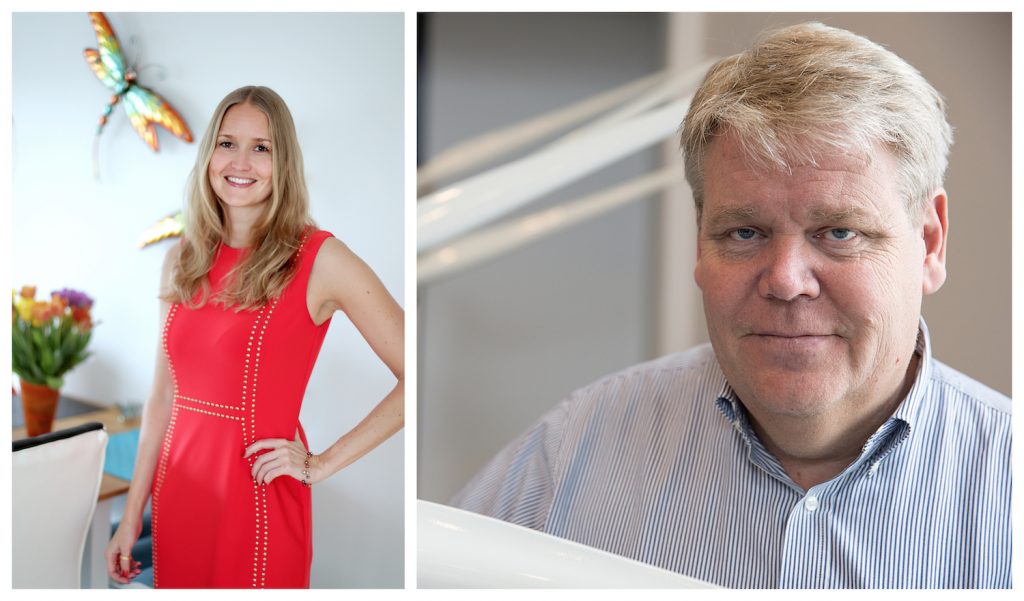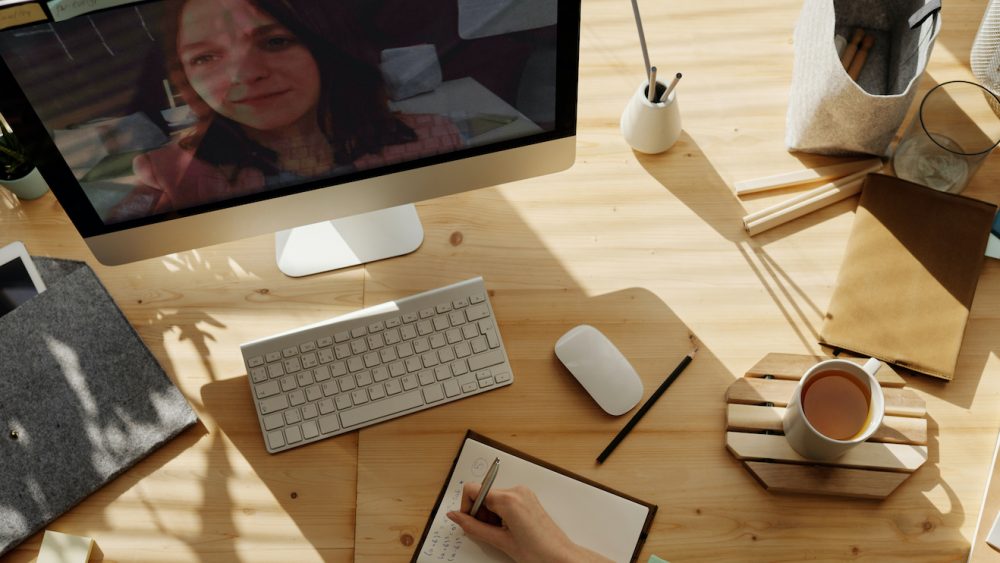Just over seven months old, the pandemic has affected large parts of each individual’s everyday life. It has affected how we shop, move about, work and not least communicate with other people. In a very short time, we have switched over to working from home, social distancing and digital meetings. Conference tools that were previously an unusual element of our meeting habits are now handled with great confidence by both colleagues and students at Lund University. The early days of fumbling in the dark with meeting participants trying to figure out who was talking to whom, people struggling with connection problems and at least one participant appearing against a backdrop of kitchen appliances, are now a thing of the past for most people. Now everyday life features a digital coffee-break with colleagues, with good lighting, high image and sound quality and a magnolia tree or the main University building as a background image.
It is obvious that the pandemic has shaken people’s foundations, but what will happen afterwards? How will working life change and what demands does that place on future leaders? We spoke with alumni and industry figures Bert Nordberg and Nina Åxman about their views on the pandemic’s effect on future working life and leadership.

“Digitalisation has jumped forward by a decade”
Bert Nordberg chairs the board of Danish TDC Group and Vestas, as well as being the proud founder of Sigma Connectivity in Lund, a board member in several major companies and vice chair of LU Holding. What effects does Bert believe the pandemic will have on future working life and leadership?
“I am quite sure that digitalisation has jumped forward by a decade. People have now understood that videoconferencing systems such as Zoom, WebEx and Teams, together with the fibre optic network we have here in the Nordic area, means that we can work remotely much more and that this type of work is more accepted. People won’t pay so much attention to the ordinary working hours of 8 to 5 anymore either. People will perform their duties but not necessarily during office hours. This in turn will place different demands on leadership.”
Even with good digital tools, Bert sees challenges associated with only meeting digitally. Not all issues are equally easy to negotiate in a digital conference room.
“Of course there are downsides to not meeting as usual. If you work with mechanical issues and reporting results, it is perfectly fine to meet digitally. But if you are to have an intellectual debate about a future strategy, it is very difficult only to see one another digitally. In that case you must meet up. I am currently working like this with my board work and I have been doing so for about six months. With purely practical issues, it works fine, but with strategic issues it is more complicated. That requires a combination of meeting digitally and in real life.”
When it comes to future leadership, Bert considers one of the most important leadership qualities to be the ability to create the conditions for closeness despite distance. Regular communication and interaction is the key to enabling your employees and the company to thrive.
“Remote working places new demands on leaders’ communication abilities. Leaders must be accessible and perceptive, and keep in touch with their employees to a much greater extent than previously, when people met up at the office on a daily basis. If you want to retain good employees, it is important to ensure that they identify with the company’s brand and culture. Once the pandemic subsides, I would recommend having at least one day a week together at the office. Employees must come in and interact with their colleagues. You can’t work only for money; you also need to be energised by your colleagues.”
Remote working also has a great impact on the requirements for our physical work environment, Bert believes. Our office landscapes will look different, with a reduced need for vast expanses of cubicles but a greater need for meeting places for employees who spend most of their time working remotely.
“You can’t work in total isolation; you need meeting places. Once the pandemic is over, companies will need rooms where employees can come in from remote working and meet up. Companies are not only bilateral links between managers and employees; they also need the interaction between employees to develop. This is why meeting places are needed at the office for meetings and discussions between employees.”
“I often use the example of solving a crossword puzzle. It’s pretty difficult to do on your own. If seven people tackle it together it is much easier. If they are allowed to talk to each other. Otherwise it’s no use.”
Bert also observes that people have changed their habits outside working life in connection with the pandemic.
“We have taken a huge step forward with e-commerce and digital trade. People are shopping online to a greater extent today. There will definitely be less travel, both private and for business. Here in Sweden, we have learnt that there is a lot to see on home ground, you don’t need to travel abroad to satisfy your holiday needs. In the work context, nobody is going to think it is worth travelling from Skåne to take part in a short meeting in Stockholm. We will continue to have digital meetings. I also believe that, for the first time, digital signatures will be legally acceptable to a greater extent. Bank ID will enable us to manage many situations which previously required a signature in ink.”
“My understanding is that the development that we are seeing now over a short time would have happened anyway, but it would have taken an additional ten years. What we’ve actually done is gained ten years in our future.”
“Starting to see digital technology as a core ability”
Nina Åxman, who is also featured in a recent alumna portrait (Master’s degree in Industrial Management and Engineering 2009), works as Vice President for Global Operations at Sandvik Rock Tools and was recently appointed “Future female leader 2020” by the managers’ organisation Ledarna. What effects does Nina believe the pandemic will have on future working life and leadership?
“I believe we will see a shift of job opportunities and turnover from certain sectors to others, as the recovery in certain sectors will take time or may never return to previous levels. Hopefully, all the green investments in the wake of the pandemic are the start of an accelerated transition to a more sustainable society and industry.”
Nina also highlights a change in how people view the office space and its purpose.
“The office is to be an inviting and inspiring meeting place for interaction and collaboration, rather than a place where you simply have to be. As an employee, where you carry out your work duties will be less important; I predict that this flexibility will lead to more remote working and less commuting. We will become much better at using digital technology for effective collaboration and we will start to see it as a core ability that we actively develop within the organisation. There will be less travel as it will partly be replaced with digital interactions for things as different as trade fairs/client events and acceptance tests for new equipment.”
“Beyond the office as well, I think that many people have adopted new digital habits (such as online food shopping) which will continue and affect many sectors.”
Nina predicts that the increased flexibility in working life will place different demands on future leaders.
“As we become more flexible about where and how we work, this places different demands on how we lead. Both with regard to clarity in setting expectations and follow-up but also around the softer aspects of communication. A future manager will need to guide, reward and coach employees on the basis of performance and results, not attendance. And managers need to ensure that culture, values and work processes support and facilitate this type of workday. In this type of environment, the companies that maintain a strong focus on employee issues, especially inclusion and team-building, will be successful. It is important for future leaders to be digitally curious and eager to continuously improve the team’s collaboration.”
——————————-
The picture of future working life, after the pandemic, as painted by Bert Nordberg and Nina Åxman, is inspiring in many ways. A more flexible approach to work and our working hours, in combination with a new focus on the office and meeting places to encourage interaction between employees, sounds undeniably exciting. The increased flexibility can hopefully be a piece of the puzzle that will help many people to improve their work-life balance in the “new normal” everyday life.
Photos: News Öresund – Johan Wessman, CC BY 2.0 (Bert Nordberg) Karina Ljungdahl (Nina Åxman)


Bob Kurniawan
Great insight! do you mind if I share it with my network in Linkedin?
Maria Johansson
Hi Bob!
Happy to hear! Yes, you are welcome to share the article on Linkedin!
Kind regards, Maria
Lund University Alumni Office